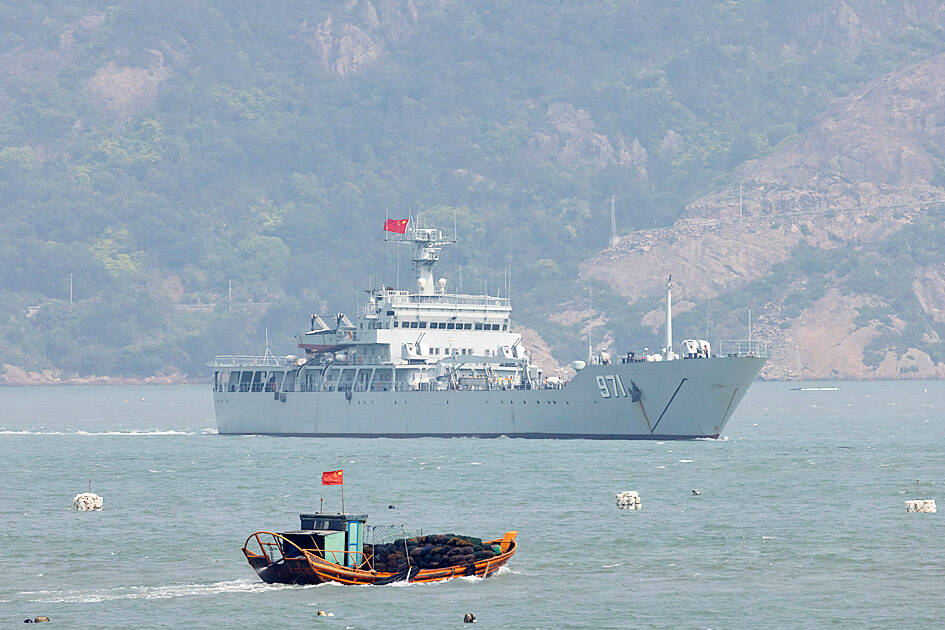China is sending balloons over Taiwan as a warning against the presidential election result and in an effort to weaken the nation’s sovereignty, US daily The Hill reported on Monday.
Frequently sending balloons over Taiwan is part of China’s increasing effort to “coerce and intimidate” the nation after voters “flouted Beijing’s warning” about Vice President William Lai (賴清德), who won the presidential election on Jan. 13, the paper said.
Chinese spy balloons flew into Taiwanese airspace almost daily before and after the election, it said.

Photo: Reuters
Beijing’s actions are a “signal about increased surveillance,” but tensions are unlikely to further escalate, it quoted Kristen Gunness, a senior policy researcher at the RAND Corporation, as saying.
“Balloons are a big deal, but it’s not enough of one to be able to — especially if Taiwan isn’t doing anything about it — to provoke a conflict or crisis,” she said.
Beijing is facing an ailing economy at home and would like to avoid stoking tensions with Washington, which might stop it from taking aggressive actions “this year or in the immediate future” unless it is provoked by events such as Taiwan declaring independence, she said.
However, China would continue “what it’s been doing, which is basically conduct air and maritime operations around Taiwan to show that they can control the maritime and airspace,” she said.
Other experts expressed graver concerns over the possibility that Beijing might launch military actions against Taiwan, the paper said, citing US Indo-Pacific Commander Admiral John Aquilino, who predicted that China would step up its aggressive behavior after the election.
The Chinese spy balloons are used globally, but they “are unlikely to be practically useful for surveillance” in Taiwan, where China already has eyes and ears, it said.
Hung Ho-fung (孔誥烽), a political economy professor and East Asia expert at Johns Hopkins University, said the balloons are “part of a Chinese tactic to diminish Taiwanese independence.”
Beijing aims to “squeeze the airspace and then blur the line” between two sides across the Taiwan Strait “as much as possible to establish a kind of status quo” where no clear boundary exists, the article quoted him as saying.
The article also quoted an analysis released on Thursday by US-based think tank the Institute for the Study of War, which said that China is attempting to “normalize using balloons in tandem with other aerial and naval” air defense identification zone incursions “to wear down Taiwan’s threat awareness.”
Sending balloons is unlikely to push the US or Taiwan to any action, it said.
Colonel Wang Chia-chun (王家駿), deputy head of the Ministry of National Defense’s joint operations planning section, earlier this month said that the military would not shoot down the balloons, as it would be a waste of ammunition and give Beijing the reaction it wants.

An essay competition jointly organized by a local writing society and a publisher affiliated with the Chinese Communist Party (CCP) might have contravened the Act Governing Relations Between the People of the Taiwan Area and the Mainland Area (臺灣地區與大陸地區人民關係條例), the Mainland Affairs Council (MAC) said on Thursday. “In this case, the partner organization is clearly an agency under the CCP’s Fujian Provincial Committee,” MAC Deputy Minister and spokesperson Liang Wen-chieh (梁文傑) said at a news briefing in Taipei. “It also involves bringing Taiwanese students to China with all-expenses-paid arrangements to attend award ceremonies and camps,” Liang said. Those two “characteristics” are typically sufficient

A magnitude 5.9 earthquake that struck about 33km off the coast of Hualien City was the "main shock" in a series of quakes in the area, with aftershocks expected over the next three days, the Central Weather Administration (CWA) said yesterday. Prior to the magnitude 5.9 quake shaking most of Taiwan at 6:53pm yesterday, six other earthquakes stronger than a magnitude of 4, starting with a magnitude 5.5 quake at 6:09pm, occurred in the area. CWA Seismological Center Director Wu Chien-fu (吳健富) confirmed that the quakes were all part of the same series and that the magnitude 5.5 temblor was

The brilliant blue waters, thick foliage and bucolic atmosphere on this seemingly idyllic archipelago deep in the Pacific Ocean belie the key role it now plays in a titanic geopolitical struggle. Palau is again on the front line as China, and the US and its allies prepare their forces in an intensifying contest for control over the Asia-Pacific region. The democratic nation of just 17,000 people hosts US-controlled airstrips and soon-to-be-completed radar installations that the US military describes as “critical” to monitoring vast swathes of water and airspace. It is also a key piece of the second island chain, a string of

The Central Weather Administration has issued a heat alert for southeastern Taiwan, warning of temperatures as high as 36°C today, while alerting some coastal areas of strong winds later in the day. Kaohsiung’s Neimen District (內門) and Pingtung County’s Neipu Township (內埔) are under an orange heat alert, which warns of temperatures as high as 36°C for three consecutive days, the CWA said, citing southwest winds. The heat would also extend to Tainan’s Nansi (楠西) and Yujing (玉井) districts, as well as Pingtung’s Gaoshu (高樹), Yanpu (鹽埔) and Majia (瑪家) townships, it said, forecasting highs of up to 36°C in those areas